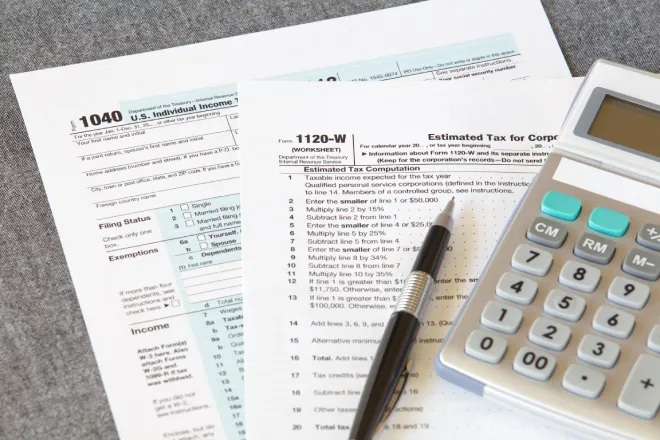
New tax cuts mostly favor the rich across states this year
© Jerome Maurice - iStock-1426962165
Missouri Republicans may take their tax-cutting efforts to new heights this year as lawmakers consider exempting profits from the sale of stocks, bonds and real estate from state income taxes.
Part of a broader push to eliminate the state income tax altogether, legislation making its way through the Capitol would provide an unprecedented benefit to the wealthy by excluding capital gains, the long-term earnings from the sale of assets. If approved, tax experts say, the legislation would mark the first time a state with an income tax has eliminated capital gains tax.
The Republican sponsors say the move would make the state more attractive for businesses and families.

© iStock - Ligorko
“This bill is intended to energize Missouri’s economy,” Republican Speaker Pro Tem Chad Perkins said upon introducing the measure.
But state Democrats — and even some of their GOP colleagues — have criticized the measure as being overly favorable to the wealthy. Most states’ tax systems already put a higher tax burden on lower-income households. That trend only accelerated in this year’s legislative sessions, worrying advocates who want to see the rich pay a larger share.
“It is so egregious in just how grossly concentrated the benefits of the [Missouri] proposal would go to the richest people in the state and shift the state’s tax system to really privilege the owners of wealth over people who are earning a regular paycheck,” said David Cooper, an analyst at the left-leaning think tank Economic Policy Institute.
The institute advocates for progressive state taxes — those that put the proportionately largest tax burdens on the highest earners. While Cooper advises against eliminating state income taxes, he said the Missouri move would be more harmful than eliminating the income tax outright.
“If you’re wiping away the income tax altogether, there’s at least some tax benefit going to lower-earning folks who are still paying income taxes,” he said. “If you’re just eliminating capital gains income taxes, you are just giving away money to the wealthiest people in the state, period.”
It is so egregious in just how grossly concentrated the benefits of the proposal would go to the richest people in the state.
– David Cooper, Economic Policy Institute analyst
Some Democratic-led states, including Maryland and Washington, have moved to increase taxes on the wealthy this year. But several states — including Kansas, Kentucky and Mississippi — have made more regressive tax changes.
Jared Walczak, vice president of state projects at the conservative-leaning Tax Foundation, noted that states still prioritize progressive spending through social service programs aiding the most vulnerable residents.
He said states compete against each other for business and residents in much more immediate ways than the federal government competes against other nations.
“So states are very focused on the competitive advantages associated with a pro-growth tax regime,” he said, “and that has led to less of an emphasis in many states on achieving progressivity through the tax code.”
‘Generational change’ to taxes
While several states have enacted high-profile tax cuts this year, the momentum is actually slowing, Walczak said.
With booming economies and an influx of federal cash in recent years, conservative and liberal states alike passed significant tax cuts. Of the 43 states that have some sort of income tax, 28 have made rate reductions since 2021, Walczak said.
“In many states, lawmakers simply accomplished much of what they had set out to do,” he said.
Economic uncertainty and the prospect of reduced federal aid also have made many lawmakers more cautious this legislative season, he said.
But lawmakers in several states — including Oklahoma, South Carolina and West Virginia — have continued their march to eliminate state income taxes.
“Taxing people’s wages is bad because it undermines liberty,” Oklahoma state Sen. Dusty Deevers, a Republican, said this month in support of a proposed income tax cut, the Oklahoma Voice reported. “It undermines people’s freedoms. If government controls income, then it controls your life.”
This session, Kentucky Democratic Gov. Andy Beshear signed a bill cutting the state income tax rate from 4% to 3.5%. Republican lawmakers have been slashing rates for years with the ultimate aim of eliminating the income tax altogether, despite concerns that more reliance on sales tax would disproportionately burden the poor. To partially offset the income tax reduction, the legislature expanded sales taxes to more services in 2018.
And Republican lawmakers in Kansas overrode a veto from Democratic Gov. Laura Kelly to move away from the state’s graduated income tax toward a flat tax of 4% that will mostly benefit the highest earners.
Last month, Mississippi Republican Gov. Tate Reeves signed legislation granting another cut in the state income tax. Officials there aim to phase out the income tax altogether over the coming years with gradual rate reductions, which Reeves characterized as “a generational change” for the state.
The Mississippi law also reduces the sales tax on groceries and increases the gas tax. Though the governor is already celebrating the end of state income tax, the law provides for incremental reductions in the coming years only if the state hits certain revenue targets.
Republican state Rep. Trey Lamar, a legislative sponsor, said income taxes disincentivize work — a particular problem for the state with the nation’s lowest workforce participation rate.
“A tax on work is a tax on productivity,” he said.
The left-leaning Institute on Taxation and Economic Policy says the law will make the state’s tax system more inequitable. Its analysis found that when fully implemented, the top 1% of households, who have average annual incomes of $1.4 million, will receive an average cut of $41,420, or roughly 3% of their annual income. But the bottom 20% of earners, who have average annual incomes of $13,400, would realize a tax cut of just $42 per year.
Lamar noted the legislation did not increase sales taxes across the board. With average sales tax burdens already lower than neighboring states like Alabama, he said the income tax elimination will only help Mississippi workers.
“We need more people working,” he said. “So if helping the working man is somehow seen as regressive, then I’d have to say I don’t fully understand that.”
Walczak, of the Tax Foundation, said the state can afford the initial rate reduction. But it’s unclear whether state revenues will hit the targets needed — and whether lawmakers will reassess the aim of eliminating income taxes.
As one of the nation’s poorest states, Mississippi is heavily reliant on federal funding and would be particularly vulnerable to an economic downturn.
“There’s not a guarantee that the state could afford that in the future, and Mississippi does not have a large budget to begin with, so that would be harder than in most other states if the economy slid,” he said. “It does require a willingness on lawmakers’ parts to be honest with themselves if the economy changes and decide whether a pause might be necessary.”
An uneven tax burden
Economic uncertainty and slowing revenues have put many states into budget holes this year, forcing lawmakers to consider spending cuts or tax increases.
To close budget gaps, some conservative and liberal states have considered new or higher taxes on marijuana, tobacco and soda.
But some liberal-led states are looking to taxes more focused on the wealthy. In Rhode Island, Democratic Gov. Daniel McKee has proposed a 10% tax on digital advertising revenue.
In Washington state, lawmakers approved raising capital gains taxes and business taxes to close a looming deficit, though it’s unclear whether Democratic Gov. Bob Ferguson, who has voiced skepticism, will sign off on those measures.
Maryland lawmakers, facing a $3 billion deficit, recently approved $1.6 billion in new taxes and fees. That includes two new high-income tax brackets and a new 3% sales tax on information technology and data services.
Moves like those that ask more of the wealthy could make some state tax systems more progressive, said Aidan Davis, the state policy director at the Institute on Taxation and Economic Policy. But most state tax proposals approved this year have primarily benefited the highest earners.
That’s particularly concerning because most state systems already favor the wealthy. In 41 states, the top 1% of earners pay a lower effective tax rate than any other group, according to an institute study.
In Missouri, the fate of the first-of-its-kind capital gains tax elimination remains up in the air.
Though versions of the proposal have passed both chambers, there are differences between the Senate and House legislation. That means the bill could go back to conference committee for further negotiation or go on to Republican Gov. Mike Kehoe, who has identified capital gains among his tax cut priorities this year.
Missouri’s Department of Revenue estimated the exemption could cost $111 million per year. But an Institute on Taxation and Economic Policy analysis of IRS data projects the change could cost $600 million or more.
If approved, the top 5% of Missouri households — those making more than $273,000 per year — will receive more than 80% of the benefit from capital gains exemption, Davis said.
“Doing so would let wealthy people collect tax-free passive income while you’re continuing to tax middle class workers and people with savings,” Davis said. “It’s just a really extreme proposal.”

















